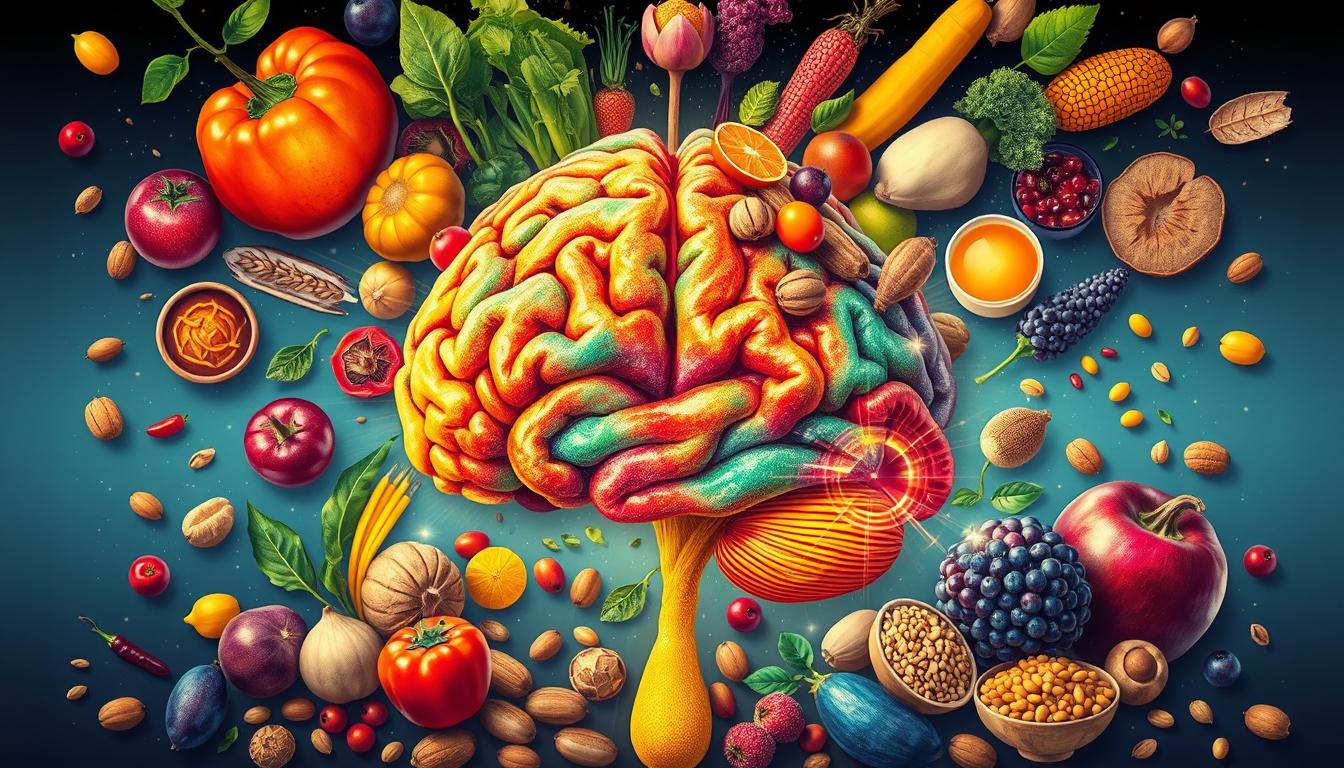Mindful Eating: How Nutrition Affects Mental Health

A growing number of Americans see the connection between what they eat and their mental health. A survey found that 66% of 2,200 people know how food affects their mood and mental health. This knowledge is leading to healthier eating habits, with 81% ready to change their diets for better mental health.
The brain-food connection is clear: foods rich in nutrients give our brains the vitamins, minerals, and antioxidants they need. These protect our brains from damage. But, eating too much sugar and processed foods can cause inflammation and hurt our thinking skills.
Many people are working to improve their diet and mental health. The survey shows that 66% want to drink more water. Also, 50% and 53% aim to eat more fruits and vegetables. These changes can greatly help our brain function and mental health.
Key Takeaways
- 66% of Americans recognize the influence of diet on mental health
- 81% are willing to modify their diets for better mental wellness
- Nutrient-rich foods protect the brain from oxidative stress
- Ultra-processed foods can impair cognitive function
- Increasing hydration and fruit/vegetable intake are popular dietary goals
- The brain-food connection is crucial for mental well-being
Understanding the Brain-Food Connection
The connection between what we eat and our mental health is deep. Our diet affects our brain function and how well we think. Let's look at how our food choices impact our mental well-being.
The Science Behind Nutrition and Mental Well-being
Studies show that diet is key to mental health. A study found that students on a Mediterranean diet had a 42% lower risk of depression. This shows the value of eating fruits, veggies, and healthy fats for our mental health.

How Food Choices Impact Brain Function
Our brain uses 20% of our daily calories, about 400 calories. Eating the right amount of fat is crucial for brain health. Eating less than 45 grams of fat daily can lead to depression. Aiming for 65 grams of fat daily is best for brain function and mood.
The Role of Nutrients in Cognitive Performance
Carbs and proteins are essential for our brain. We need about 50% of our daily food as carbs to avoid brain fog. Eating 15-20% protein (50-100 grams for adults) boosts serotonin and reduces stress, improving mental clarity. Omega-3 fatty acids help with ADHD and depression.
Nutritional deficiencies can harm our mental health. Eating a balanced diet is vital for brain health and preventing mental issues. If you're feeling anxious or depressed, talk to experts like Gundersen Behavioral Health for help.
How Nutrition Affects Mental Health
The connection between diet and mental health is becoming more clear. Studies show that our food choices greatly impact our mood and well-being. For example, the Mediterranean diet has been shown to reduce depression symptoms by 20.6 points.
For more information regarding psychiatry, particularly in Venice, FL:
Davenport Psychology, Venice 200 Capri Isles Blvd., Ste. 7G Venice, FL 34292 941-702-2457 https://davenportpsychology.com/locations/venice-psychology-office/
Eating a balanced diet is essential for brain health and mood management. Foods like vegetables, whole grains, and healthy fats are crucial. Regular meals help keep blood sugar stable, preventing mood swings and tiredness. Drinking enough water is also vital, as dehydration can harm focus and energy.
The American Psychiatric Association highlights diet's role in mental health. Over 81% of adults are open to changing their diet for better mental health. This growing interest is fueling more research in nutritional psychiatry.
| Nutrient | Mental Health Benefit | Food Sources |
|---|---|---|
| Omega-3 Fatty Acids | Supports brain function | Oily fish, nuts, seeds |
| Complex Carbohydrates | Stabilizes mood | Whole grains, fruits, vegetables |
| Protein | Regulates mood | Lean meats, legumes, dairy |
By practicing mindful eating and choosing foods that support mental health, we can improve our emotional state. The link between nutrition and mental health shows the need for a comprehensive approach to treating mood disorders and depression.
The Gut-Brain Axis: Your Second Brain
Your gut is more than just a place for digestion. It's a complex system that affects your health, including your mind. Scientists call it our "second brain" because of its strong connection to our brain.
The Microbiome and Mental Health Connection
The human gut is home to a huge community of microorganisms, called the microbiome. It has about 500 million neurons, compared to the 100 billion in our brain. These gut bacteria make neurotransmitters like serotonin and GABA, which help control our mood and emotions.
Serotonin Production in the Gut
Did you know most of our serotonin, the "happy hormone," is made in our gut? This shows how closely our gut health is linked to our emotional state. Studies have shown that some probiotics can boost GABA production and lower anxiety in mice.
Impact of Gut Health on Emotional Well-being
Our gut health greatly affects our emotions. Research shows that people with irritable bowel syndrome often have a less active vagus nerve. This nerve connects our gut and brain, explaining why gut issues and mental health problems often occur together.
- High-fiber foods can reduce stress hormones
- Omega-3 fats in oily fish boost good gut bacteria
- Fermented foods alter brain activity positively
By taking care of our gut through diet and lifestyle, we can improve our mental health. The connection between our gut and brain is key to emotional balance and cognitive function.
Essential Nutrients for Mental Wellness
Good nutrition is key for mental health. Studies show some nutrients are vital for brain function and mood. Let's look at important nutrients for better mental wellness.
Omega-3 Fatty Acids and Brain Health
Omega-3 fatty acids are crucial for brain health. EPA and DHA, two types, are especially good. They help keep mood stable and prevent stress spikes. Find them in fatty fish, walnuts, and flaxseeds.
Vitamins and Minerals for Mental Function
Many vitamins and minerals are important for mental health:
- Vitamin D supports serotonin production and new brain cell growth
- B vitamins help produce energy for new brain cells
- Vitamin C is essential for cognitive performance
- Magnesium helps regulate brain receptors involved in development
- Zinc maintains DNA integrity in brain cells
Complex Carbohydrates and Mood Stability
Complex carbohydrates are key for mood. They give the brain steady energy, keeping mood stable. Eat brown rice, quinoa, sweet potatoes, and beets for this benefit.
| Nutrient | Food Sources | Mental Health Benefits |
|---|---|---|
| Omega-3 fatty acids | Salmon, walnuts, flaxseeds | Mood stability, cognitive function |
| Vitamin D | Sunlight, fatty fish, eggs | Serotonin production, brain cell growth |
| Complex carbohydrates | Brown rice, quinoa, sweet potatoes | Steady energy, mood regulation |
The Impact of Processed Foods on Mental Health
Processed foods are a big part of the American diet. Studies show that about 60% of calories in the average U.S. diet come from these foods. This is a concern for mental health.
Research shows that processed foods can cause inflammation and oxidative stress in the brain. These can harm cognitive function and mood. A study of 17 studies, with 385,541 participants, found scary links between these foods and mental health issues.
The study found that eating more of these foods is linked to depression and anxiety. The odds ratio for common mental disorder symptoms was 1.53. For depression, it was 1.44, and for anxiety, it was 1.48.
Long-term effects are even more worrying. Studies showed that eating more of these foods increases the risk of depression. The hazard ratio was 1.22.
| Mental Health Issue | Odds Ratio |
|---|---|
| Common Mental Disorder Symptoms | 1.53 |
| Depressive Symptoms | 1.44 |
| Anxiety Symptoms | 1.48 |
Ultra-processed foods often have ingredients like high-fructose corn syrup and artificial additives. These can cause inflammation and oxidative stress, harming brain health. Eating whole, unprocessed foods can help our mental well-being and lower the risk of mood disorders.
Mindful Eating Practices for Better Mental Health
Mindful eating is about being fully present when we eat. It helps us connect better with our food. By paying attention to our senses and hunger, we can feel better and eat healthier.
Techniques for Mindful Eating
To start mindful eating, eat slowly. Chew well and enjoy each bite. Notice the taste, texture, and smell of your food. This can make you feel more satisfied and help you eat the right amount.
Creating Healthy Eating Habits
It's important to eat well for our mental health. Plan your meals and pick foods that are good for you. Don't eat in front of TV or phones. Instead, focus on eating and enjoy your food.
Mindfulness During Meals
Eating mindfully can change how we experience food. Before you eat, think about how lucky you are to have food. While eating, listen to your body's signs of fullness. This can stop you from eating too much and help you have a better relationship with food.
- Engage all senses while eating
- Tune into hunger levels
- Eat slowly and mindfully
- Be grateful for food sources
By adding these mindful eating habits to your life, you can lower stress, improve digestion, and make better food choices. Remember, mindful eating is about being present and aware of how we eat, not about being perfect.
Nutrition Strategies for Managing Stress and Depression
Eating right is key to managing stress and improving mood. A study showed 81% of adults would change their diet for better mental health. Let's look at how food choices can help with stress and depression.
Anti-inflammatory Foods for Mood Support
Anti-inflammatory foods can boost your mood. Include fruits, vegetables, and omega-3 rich foods in your diet. Dark leafy greens, nuts, and seeds are excellent options.
A Mediterranean diet is also known for its mood-boosting effects. It has shown to reduce depression symptoms.
Stress-Reducing Dietary Choices
Some foods can lower stress levels. Complex carbs like whole grains increase serotonin, a mood booster. Healthy fats in avocados and olive oil support brain health.
Stay away from processed snacks and sugary foods. They can cause energy crashes and mood swings.
| Food Type | Benefits | Examples |
|---|---|---|
| Anti-inflammatory | Mood support | Berries, leafy greens, fatty fish |
| Complex carbs | Stress reduction | Brown rice, quinoa, oats |
| Healthy fats | Brain function | Avocados, nuts, olive oil |
By focusing on these nutrition strategies, you can create a diet that supports your mental well-being. Remember, small changes can make a big difference in managing stress and improving your mood.
Building a Mental Health-Supportive Diet
Creating a diet for mental health means planning meals, shopping smart, and picking healthy snacks. Studies show a balanced diet is key for mental well-being.
Meal Planning for Mental Wellness
Meal planning is essential for a healthy diet. Include foods high in omega-3 fats, vitamins B and D, magnesium, and antioxidants. These help improve mood and lower depression risk.
Try a Mediterranean-style diet. It's been shown to boost mental health.
Smart Shopping Guidelines
When you shop, use a list to avoid buying things on impulse. Choose whole foods over processed ones. Stock up on fruits, veggies, whole grains, and lean proteins. Healthy shopping is vital for mental wellness.
Healthy Snacking Options
Healthy snacks are important for energy and mood all day. Choose:
- Fresh fruits and vegetables
- Nuts and seeds
- Greek yogurt with berries
- Whole grain crackers with hummus
- Hard-boiled eggs
These snacks give you the nutrients you need without the sugar crash.
By following these tips, you're helping your mental health through what you eat. Even small changes in your diet can make a big difference in how you feel.
Conclusion
The connection between what we eat and our mental health is clear. Eating mindfully can do more than just help our bodies. It also boosts our mental health.
A diet full of nutrients is key for a healthy brain and mood. This supports our mental health in big ways.
Research shows that eating like the Mediterranean can cut down on depression by up to 10%. This diet is all about eating whole foods, lean proteins, and healthy fats. It's a big part of living a healthy, balanced life.
By choosing the right foods, we help our gut and brain work better together. This can help us feel less anxious and more emotionally balanced.
As mental health issues grow worldwide, with 13% of people affected, nutrition is a key solution. Eating mindfully and choosing nutrient-rich foods can help us stay mentally healthy. Even small changes in our diet can make a big difference in how we feel.
FAQ
How does nutrition affect mental health?
Nutrition greatly impacts mental health. A healthy diet gives the brain what it needs to stay healthy. Foods high in refined sugars and processed ingredients can harm the brain and mood. Many people know that what we eat affects how we feel.
What is the gut-brain connection?
The gut-brain connection is how our gut and brain talk to each other. It's key for our mental health. Good gut bacteria help keep our gut healthy and support our brain. Most of our serotonin, which affects mood, is made in the gut.
What are some nutrient-dense foods that support mental health?
Foods like brown rice, quinoa, and sweet potatoes are great for the brain. Lean proteins like chicken and fish are also good. Fruits, veggies, and healthy fats like olive oil are beneficial too.
How do omega-3 fatty acids benefit mental health?
Omega-3s are vital for brain health. They reduce inflammation and lower the risk of diseases like Alzheimer's. You can find them in fish, walnuts, and flaxseeds.
What is mindful eating and how can it improve mental health?
Mindful eating is about enjoying your food and being aware of your body. It can make you feel better and more satisfied. It involves eating slowly and savoring each bite.
How can I build a mental health-supportive diet?
Eat whole foods like veggies, fruits, and whole grains. Make a healthy shopping list and stick to it. Choose snacks like fruits and nuts. Include foods rich in omega-3s and lean proteins. Try to avoid foods high in sugar and processed ingredients.
Can dietary supplements help improve mental health?
Supplements like vitamins and probiotics can help. But talk to a doctor before starting them. A balanced diet is the best way to support your mental health.
How does stress affect gut health and mental well-being?
Stress can harm the good bacteria in our gut. This affects our mental health. Managing stress through diet and relaxation can help keep our gut and brain healthy.




